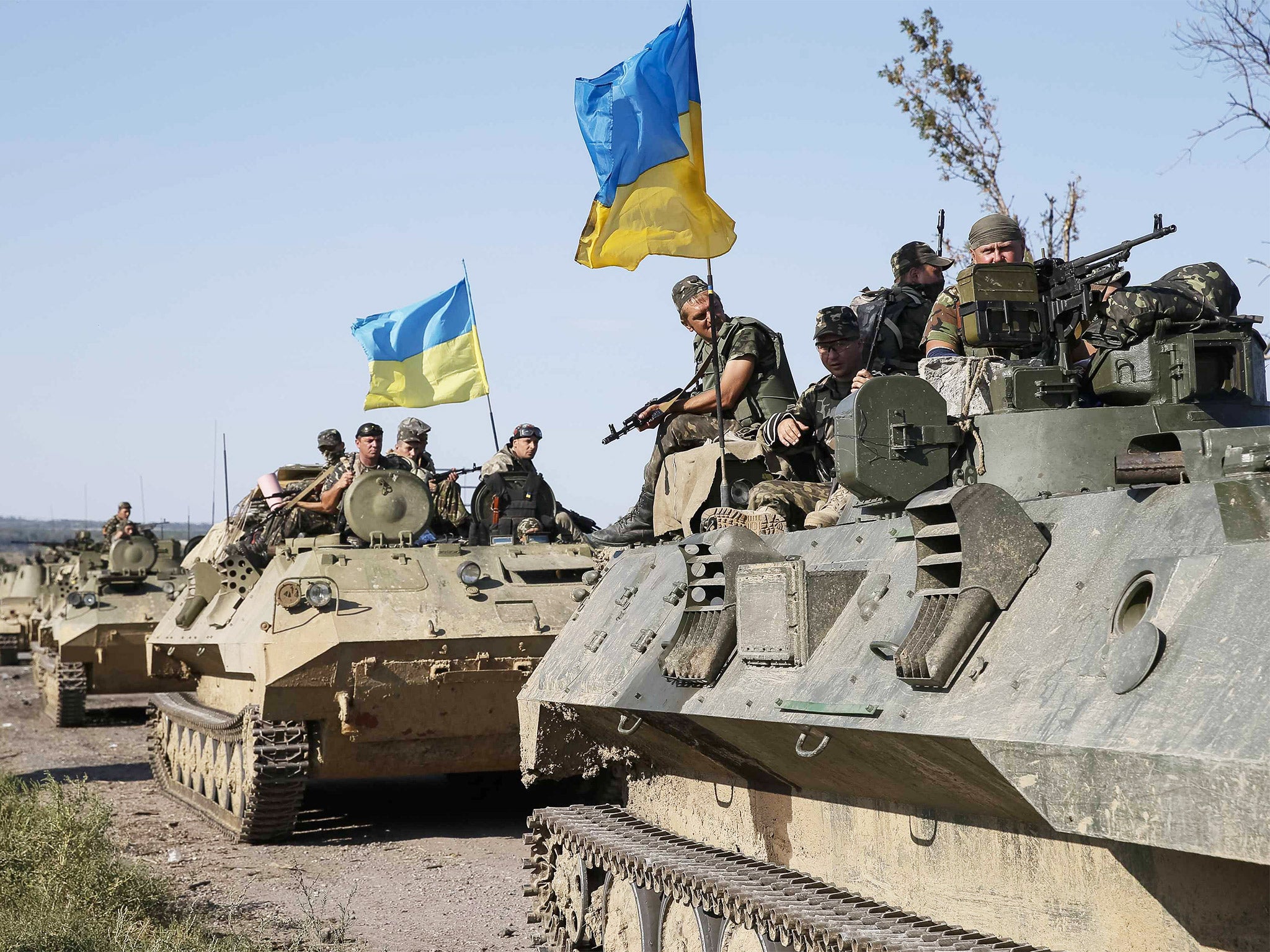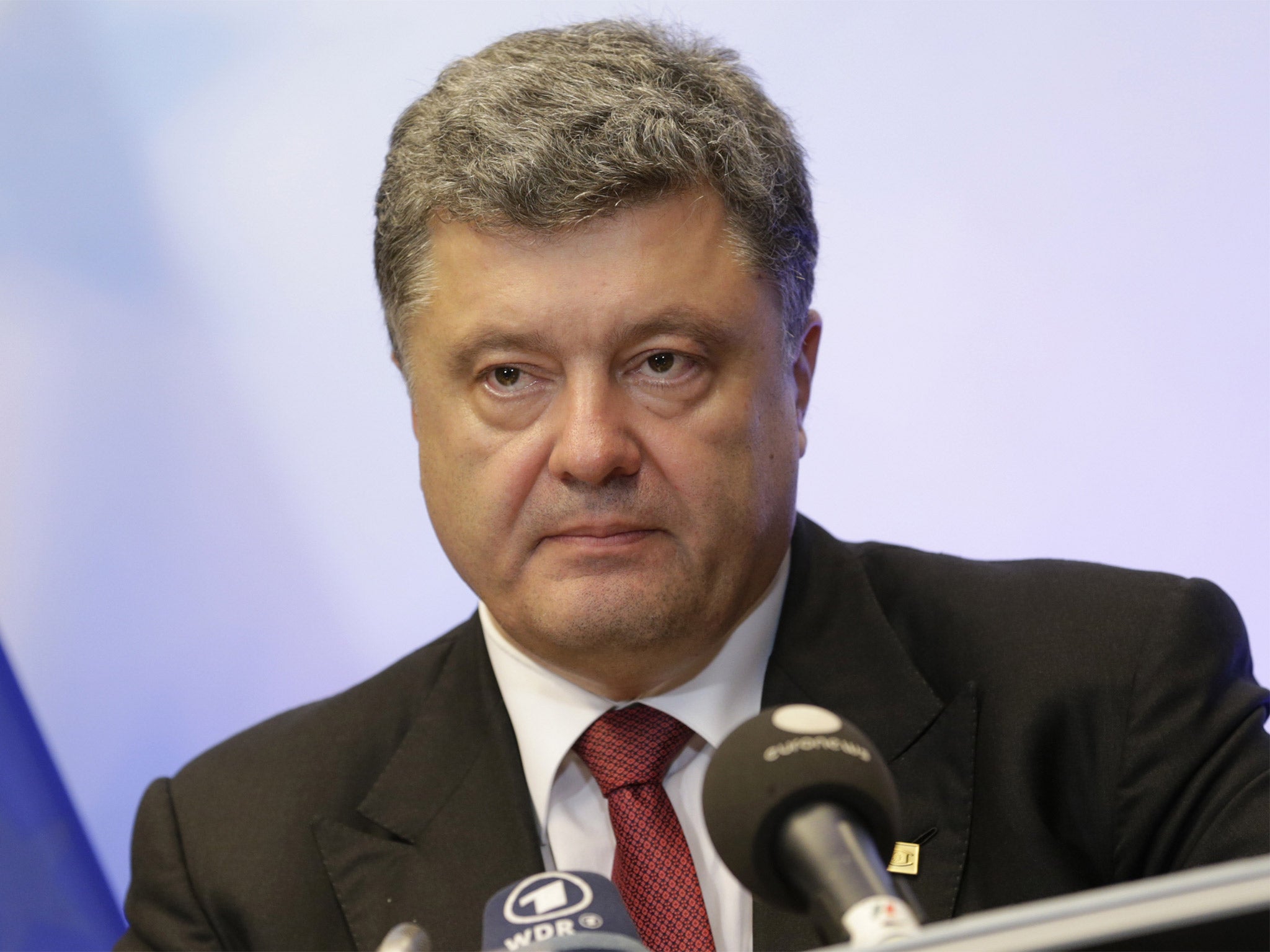Ukraine crisis: West reserves judgement on claims of ‘permanent ceasefire’
Kiev and Moscow signal progress in talks, but UK and US emphasise need for caution

President Petro Poroshenko of Ukraine claimed to have agreed a “permanent ceasefire” with the Russian President, Vladimir Putin, but his announcement seemed premature as fighting continued in the east of the country.
Mr Putin also struck an emollient tone as he claimed the two leaders’ views were “very close”, although the Kremlin stressed that an agreement had not been reached. Meanwhile, artillery explosions rocked the outskirts of Donetsk, shortly after Kiev and Moscow signalled progress in the ceasefire talks.
The talks between the two presidents came after a series of reverses for Ukrainian forces, which the government blamed on Russia sending troops across the border to bolster pro-Kremlin separatists. Tensions had risen earlier in the week when Mr Putin was reported to have boasted that his forces could sweep into Kiev within two weeks if he wanted.
Ahead of a Nato summit starting today in Newport, South Wales, President Barack Obama flew to Estonia, one of three former Soviet states on the Baltic. Mr Obama expressed his scepticism about a potential ceasefire, warning that it could be effective only if Moscow stopped sending troops into Ukraine and admitted it was covertly backing separatist fighters.
“We have consistently supported the effort of President Poroshenko of achieving a meaningful ceasefire that could lead to a political settlement,” Mr Obama told reporters.
British sources also expressed caution over reports of a ceasefire, insisting it would only be meaningful if it was observed by pro-Russian militias. And the Ukrainian Prime Minister, Arseniy Yatseniuk, claimed any talk of a ceasefire could be a Russian effort to avoid further sanctions from the West. “All previous agreements made with Russia – in Geneva, in Normandy, in Berlin and in Minsk – were ignored or brazenly violated by the Russian regime,” he said.
In France last night, the Élysée Palace announced that it was suspending the controversial delivery of a €600m (£480m) state-of-the-art warship to the Russian navy. After an emergency meeting of the National Defence Council, President François Hollande said that “conditions do not today exist” for the delivery of the first of two Mistral helicopter carriers this autumn.
Russia has paid for the ship and Russians sailors are already training aboard the vessel in St Nazaire on the French Atlantic coast. Up to last night, France had stoutly resisted pressure from the US and its EU partners to suspend its delivery. In its statement, the Élysée Palace said: “The President... has concluded that, despite the possibility of a ceasefire which remains to be confirmed and implemented, the conditions do not today exist to allow France to authorise the delivery of the first [helicopter carrier].”
Nato’s leaders will stage a show of solidarity this afternoon, as Mr Poroshenko joins them for talks on the crisis gripping his country. The turmoil in Ukraine has transformed the original agenda of the conference, which was intended to mark the withdrawal of Western troops from Afghanistan.

Political leaders, including 35 heads of government and state, will instead now debate the biggest challenge to the 28-member alliance since the end of the Cold War. They are expected to agree plans to set up an emergency force of around 5,000 troops that will be able to respond to threats to Nato members at two to five days’ notice. It will complement an existing 14,000-strong Nato response force.
The leaders will also discuss further exercises in member states bordering Russia and the Baltic countries. The moves reflect a dramatic cooling of the diplomatic temperature since the spring, when the crisis was triggered by Russia’s annexation of Crimea from Ukraine. Nato has suspended all co-operation with the Kremlin and carried out military exercises in Eastern European countries. .”
Confusion over a potential agreement began after Mr Poroshenko tweeted: “As a result of my telephone conversation with the Russian President, we reached an agreement on a permanent ceasefire on Donbas [an eastern area of Ukraine].”
Speaking during a visit to Mongolia, Mr Putin said: “Our views on the way to resolve the conflict, as it seemed to me, are very close.”
He also predicted that a final deal could be struck tomorrow in talks in Minsk, the capital of Belarus.
Join our commenting forum
Join thought-provoking conversations, follow other Independent readers and see their replies
Comments